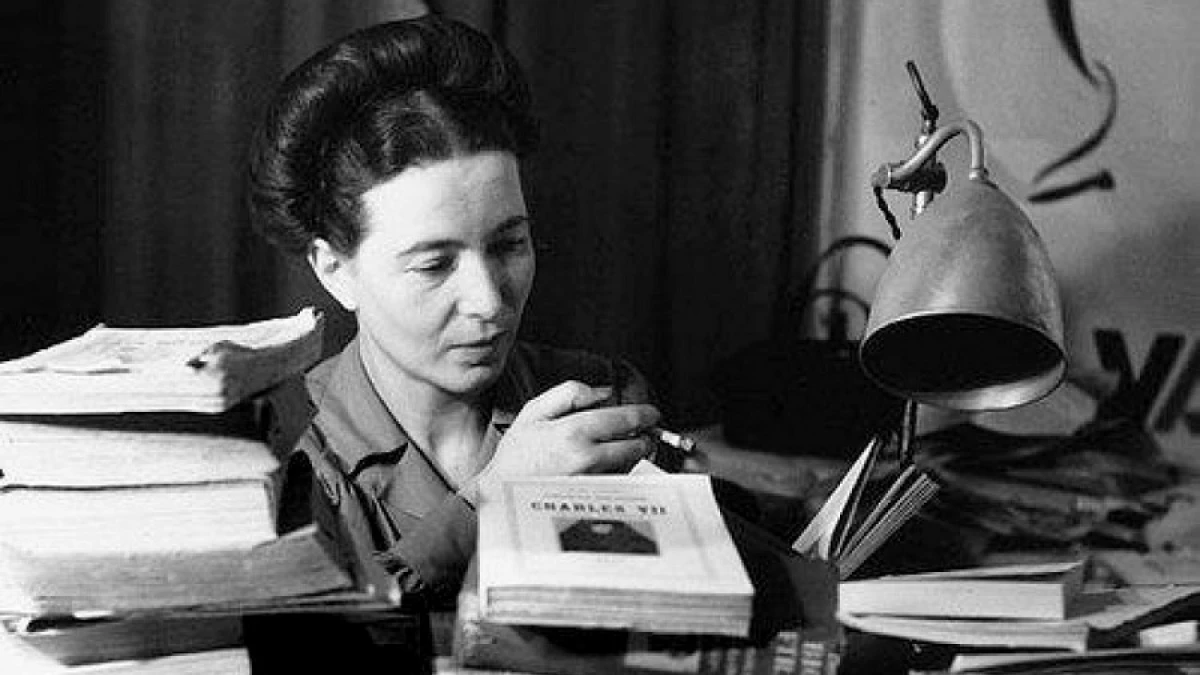(Paris, 1908-1986) French thinker and novelist, representative of the atheist existentialist movement and an important figure in the vindication of women's rights. Originally from a bourgeois family, she stood out from an early age as a brilliant student. She studied at the Sorbonne and in 1929 she met Jean-Paul Sartre, who became her companion for the rest of her life.
He graduated in philosophy and until 1943 he devoted himself to teaching at the lycées of Marseilles, Rouen and Paris. His first work was the novel The Guest (1943), followed by The Blood of Others (1944) and the essay Pyrrhus and Cineas (1944). She participated intensely in the ideological debates of the time, harshly attacked the French right wing and assumed the role of a committed intellectual. In her literary texts she revised the concepts of history and character and incorporated, from an existentialist point of view, the themes of "freedom", "situation" and "commitment".
Together with Sartre, Albert Camus and Maurice Merleau-Ponty, among others, she founded the magazine Tiempos Modernos, whose first issue was published on October 15, 1945 and became a political and cultural reference of French thought in the mid-twentieth century. Subsequently, he published the novel All Men Are Mortal (1946), and the essays For a Morality of Ambiguity (1947) and America a Day (1948).
Her book The Second Sex (1949) was a theoretical starting point for various feminist groups, and became a classic work of contemporary thought. In it she elaborated a history of the social condition of women and analyzed the different characteristics of male oppression. She asserted that by being excluded from the processes of production and confined to the home and reproductive functions, women lost all social ties and with them the possibility of being free. She analyzed the gender situation from the point of view of biology, psychoanalysis and Marxism; she destroyed feminine myths, and urged the search for authentic liberation. She argued that the struggle for the emancipation of women was distinct from and parallel to the class struggle, and that the main problem to be faced by the "weaker sex" was not ideological but economic.
Simone de Beauvoir founded with some feminists the League of Women's Rights, which set out to react firmly to any sexist discrimination, and prepared a special issue of Modern Times devoted to the discussion of the subject. She won the Prix Goncourt with The Mandarins (1954), in which she dealt with the difficulties of post-war intellectuals in assuming their social responsibility. In 1966 she participated in the Russell Tribunal, in May 1968 she showed solidarity with the students led by Daniel Cohn-Bendit, in 1972 she presided over the Choisir association, in charge of defending free contraception, and until her last days she was a tireless fighter for human rights.
Her abundant testimonial and autobiographical titles include Memoirs of a Formal Young Woman (1958), The Fullness of Life (1960), The Force of Things (1963), A Very Sweet Death (1964), Old Age (1968), The End of Accounts (1972) and The Farewell Ceremony (1981).
Megathreads and spaces to hang out:
- ❤️ Come listen to music and Watch movies with your fellow Hexbears nerd, in Cy.tube
- 💖 Come talk in the New Weekly Queer thread
- 💛 Read and talk about a current topics in the News Megathread
 Come talk in the New Weekly PoC thread
Come talk in the New Weekly PoC thread- ⭐️ September Movie Nominations ⭐️
reminders:
- 💚 You nerds can join specific comms to see posts about all sorts of topics
- 💙 Hexbear’s algorithm prioritizes comments over upbears
- 💜 Sorting by new you nerd
- 🌈 If you ever want to make your own megathread, you can reserve a spot here nerd
- 🐶 Join the unofficial Hexbear-adjacent Mastodon instance toots.matapacos.dog
Links To Resources (Aid and Theory):
Aid:
Theory:

I get this.
I have found certain artists or games interesting and delved into them deeply but it doesn't last. Once I have digested a show game, or book I don't obsess about it. If enjoyed it I may go back over it after some time has passed to see if I forgot bits or if there are new perspectives that I missed but not very often. I've played morrowind like 6 times but it gets longer between each play through. I've watched star gate SG1 2 whole times and up to season 9 twice but I'll probably never do that again.
Music is a bit different. I love Alice Cooper's music (the last couple years I have been realizing how Bigender he is.) and I do care about his life story and why he was singing about what he was singing about in each album because it adds more context and understanding. This goes for other musicians/bands I enjoy as well but I cant be bothered following what they are doing right at this moment to figure out what they are talking about when they drop a new album. If a new album comes out and I like it I may delve into it to find some of the deeper meaning but trying to preempt the understanding before knowing what I analyse is enjoyable or not seems dumb.
I enjoyed H.P. Lovecraft's writing but the realization that he was a raging white supremacist really did kinda fuck that up. Now I cant really unsee it and it ruins the stuff I haven't read before. The stuff I had read is in my mind and free of racism but I know if I reread it the racist ideas will come into focus and ruin it.
Talking with my lady she says she personalizes songs. The lyrics to her have nothing to do with what the artist was going thorough. They have a link to what she was going through at the time. So she hears 80s pop and remembers life before any trauma and the understanding of the realities of life. She hears pearl jam and thinks about a phase of her life where she was gaining independence. But she too is not a "fan" of things.
I don't know what drives fandom. Maybe its just a desire for connection and understanding because the thought of nobody ever really understanding you is too much for some people.